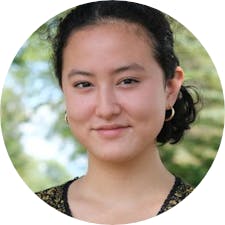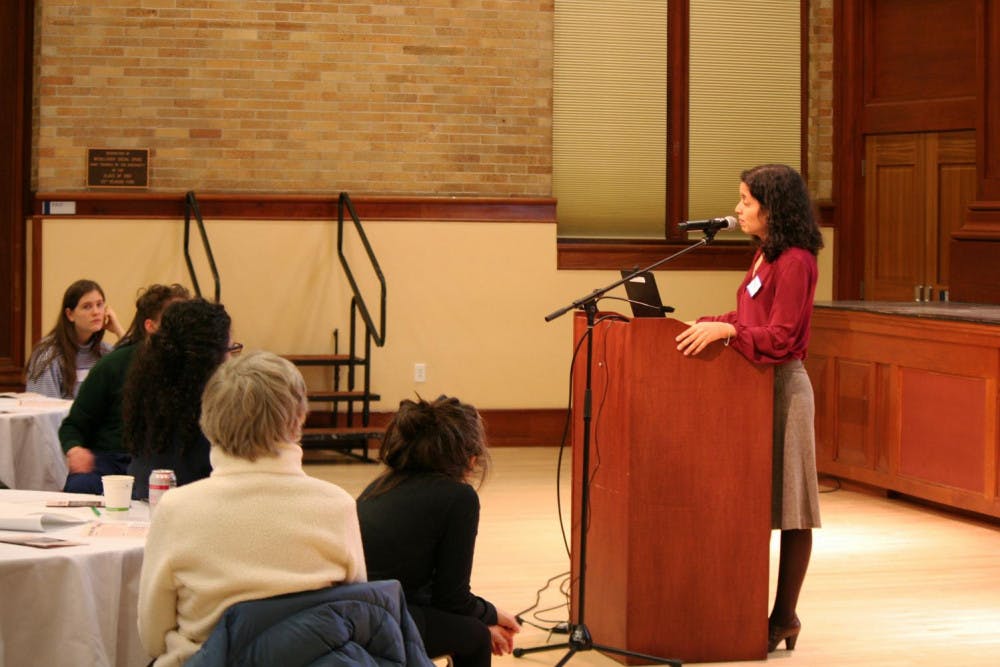Speakers probed themes of settler colonialism and its impact in three different regions during a student-organized conference titled “Bodies at Borders: The Lived Effects of Settler Colonialism.” The annual Student-Organized Global Affairs Conference took place in Wilson Hall on Jan. 13.
The three speakers included Dr. Marie Cruz Soto, a professor at the NYU Gallatin School of Individualized Study, who explained the process and impact of settler colonialism in the Puerto Rican archipelago; Dr. Thomas Abowd, who teaches at Tufts University and discussed the colonization faced by Palestinians; and Miwok journalist, activist and media producer Desiree Kane, who talked about the colonization of Native American land and the intersectionality of the issues faced by American indigenous communities.
Conveners Kamli Faour ’21, Cara Levine ’20 and Mari Odoy ’20 started the approval process for the conference in October and began planning in November. Levine found all three speakers who attended the conference.
She reached out to the author of a relevant article on JSTOR, who referred her to Cruz Soto, and heard about Abowd through a friend at Tufts. She found Kane listed among the speakers at a Princeton University conference.
“The huge emphasis of this conference is that it’s global,” Faour said. “What we were doing was we were looking to fill three different regions as best we could.”
This year’s conference took place earlier than usual as the organizers wanted to ensure that Faour could attend the event prior to her departure for a semester abroad.
Attendees of the event sat at eight tables arranged in front of a podium in Wilson Hall. These tables later became the location of seven different break-out discussions, facilitated by a Middlebury professor or conference speaker. Students, faculty and Middlebury residents participated in the discussions, drawing on personal experience as well as information they had encountered in the classroom.
Cruz Soto, the first speaker, gave a talk entitled “Strategic Spaces, Disposable People.” Born in San Juan, Puerto Rico, she dove into the history of colonialism in Puerto Rico, beginning with Spanish colonialism in the 16th century and progressing to its present-day status as an unincorporated U.S. territory.
Soto explained the U.S. Navy’s expropriation of the island, which facilitated the forced relocation of the original residents to the island’s center. She displayed maps and pictures of this relocation while highlighting the role persistent civil disobedience played in the U.S. decision to recall the Navy from the island in 2003.
“Civil disobedience is not just protesting. It’s making things unworkable, not letting the status quo be the status quo,” she said.
Abowd, the Tufts professor, spoke about the Israeli-Palestinian conflict, and addressed how identifying the conflict as settler colonialism is an approach often met with surprise and hostility. Abowd discussed how the Palestinians were pushed off their land, referencing specific cases such as the destruction of the Palestinian enclave near the Western Wall in Jerusalem, and showing maps and images to further illustrate his point.
The final speaker of the conference, Kane, played pieces of the documentary she had worked on, which follows Native American protesters of the Dakota Access Pipeline. She spoke about many of the challenges faced by women in Native American communities and attested to the intersectionality of many social justice issues. Kane called on her audience to fight against class systems in a speech that addressed both physical and non-physical borders, and called attention to the borders that divide different movements for change.
Kane also mentioned that she had reached out to the Abenaki tribe, whose land Middlebury College rests on, before coming to the summit.
At one table, attendees discussed the Mexico-United States border and their relationship with it, as well as redlining, non-physical borders and white privilege. For the most part, those seated at the table shared their own experiences with borders in the context of the topic “Border as Method: The Proliferation and Power of Borders.”
One of the students at the table, Rand Jibril ’20, described the presence of borders growing up in Palestine. She explained how the border impacts certain aspects of everyday life.
“Simple stuff like sleepovers that you can’t do when you’re a child, you don’t think, ‘This is because of the border,’ she said.
Jibril explained how she does not feel there is enough discussion about the border and settler colonialism on campus.
“That’s why I applaud the organizers of this event. I think we need to talk about it more,” she said. “I don’t think it comes up enough, whether it’s in classes or between students.”

Abigail Chang ’23 (she/her) is the Editor in Chief.
She previously served as a managing editor, Senior News Editor, News Editor and co-host of The Campus' weekly news radio show.
Chang is majoring in English and minoring in linguistics. She is a member of the Media Portrayals of Minorities Project, a Middlebury lab that uses computer-assisted and human coding techniques to analyze bulk newspaper data.
Throughout last year, Chang worked on source diversity and content audits for different media properties as an intern for Impact Architects LLC. Chang spent summer 2021 in Vermont, working as a general assignment reporter for statewide digital newspaper VTDigger. Chang is also a member of the Middlebury Paradiddles, an a cappella group.




